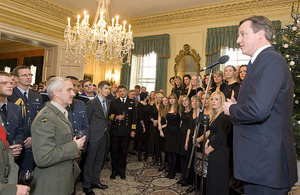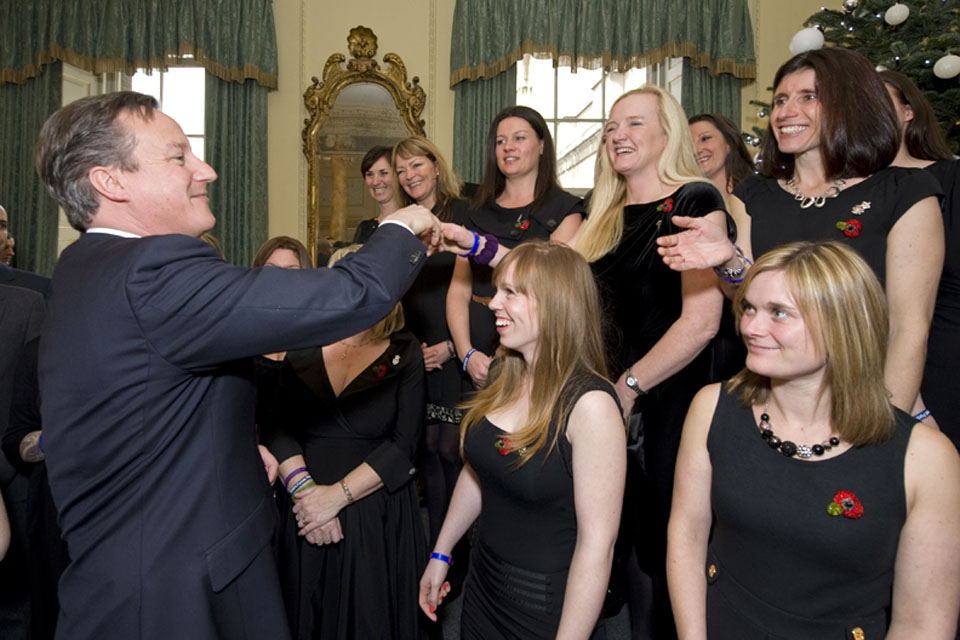Prime Minister hosts Armed Forces involved in Libya mission
British troops who were involved in this year's NATO-led operations to protect civilians in Libya attended a special reception held in their honour at Number 10 Downing Street yesterday.

Prime Minister David Cameron addresses members of Her Majesty's Armed Forces during a reception at Number 10 Downing Street [Picture: Petty Officer (Photographer) Terry Seward, Crown Copyright/MOD 2011]
The RAF, Royal Navy and Army contributed hugely to the NATO effort to protect Libyan civilians under United Nations Security Council Resolution 1973, and Prime Minister David Cameron took the opportunity to pay tribute to their professionalism, dedication and bravery in helping to assure the liberty of the Libyan people.
As members of the Armed Forces arrived in Downing Street, they were greeted by a performance by the Military Wives Choir, directed by choirmaster Gareth Malone.
Speaking to his guests yesterday, the Prime Minister said:
In the last 18 months I’ve held lots of parties in this room, lots of receptions, but I don’t think there’s any party or reception that has given me quite such an honour to hold as the one today because everyone I’m looking at in this room gave incredible service to their country in the operations in Libya, in the skies over Libya, on the sea and also on the ground.
And the first thing I want to say is just an absolutely massive thank you for all that you did and the incredible courage, professionalism and dedication that you showed.
You flew over 3,000 missions, that was 2,000 strike sorties, that was one-fifth of the total strike sorties flown by NATO. At its peak there were some 2,300 British servicemen and women deployed, along with eight warships, a hunter-killer submarine and 36 aircraft, including the first ever operational deployment of a Typhoon.
And I think it is incredibly noteworthy that the Secretary General of NATO said that he thought this was one of the most professional and most successful operations in NATO’s 62-year history.
You carried a very big burden along with some fantastic allies and some very brave other countries, but you played a huge part and bore a great burden, and the whole country should be very grateful for what you did. But it wasn’t just what you did; it was how you did it.
I’ll never forget going to Gioia del Colle and meeting some of the RAF pilots who were flying the missions and the maturity and the sense that people were showing about wanting to make sure that you hit the right target, wanting to help the NTC [National Transitional Council] rebels, wanting to stop the Gaddafi war machine, but knowing that if there was doubt in your mind you shouldn’t go ahead.
It was incredibly impressive to see the scale of debate and concern that you went through in every single one of those targeting missions and I think you can be incredibly proud not just of what you did but also the way you did it.

Prime Minister David Cameron meets members of the Military Wives Choir during a reception at Number 10 Downing Street [Picture: Petty Officer (Photographer) Terry Seward, Crown Copyright/MOD 2011]
Mr Cameron concluded by saying:
The third and final thing I want to say is about the mission itself, because of course there were some people who said ‘you know Libya is a country that’s quite far away; what does all this have to do with us? Are we doing the right thing? Will good come of it? How can we know what the outcome will be?’ Well obviously these are still early days, but I think we can actually put our hand on our hearts and say that we did a really great thing for that country.
Of course it’s not going to be a perfect, model democracy. Of course there’ll be many jolts and bumps along the road, but basically we helped that country to get rid of one of the most brutal dictators of the last century and give that country a chance of freedom and democracy and the things that we take for granted in this country. And if we hadn’t done it, that wouldn’t have happened.
Gaddafi was hell-bent on going to Benghazi and murdering and massacring his own people and it was the action that NATO countries, that Britain, that France, that America took - that you took - that stopped that massacre taking place.
So I think we have given Libya the chance of a better future, and our world is safer, our nation is safer, if more countries take the transition from dictatorship to democracy.
In Libya there is the real chance that country could be a success. It has oil wealth, it has a people yearning to be free, and it has people who are now able to be free because of the incredibly brave things that you all did in this room.
So a really heartfelt thank you from me! I can’t tell you what a thrill it is, having sat day after day - 68 meetings we had with the National Security Council in some bunker in the next door building there, and we were talking about ‘will the minesweeper get through to Misurata?’ Well, I’ve now met the people that were sailing on it.
We were talking about how HMS Liverpool is getting on trying to stop Gaddafi in Tripoli - I’ve now met, not only the captain of that ship, but he’s very kindly given me my proudest possession, one of the shell casings that was fired in anger that is now going to be an umbrella stand in the Cameron household.
I’ve even found the person - we were rather concerned why all these missions seemed to have the names of Wagnerian operas - and I’ve even found the Wagnerian enthusiast from PJHQ [Permanent Joint Headquarters] who named all these missions!
So it’s been great to have you here. I hope that, as the Chief of the Defence Staff would say, there’s been a bit of ‘jointery’ - a bit of mixing between the Services - and you’ve been able to share stories and share tales.